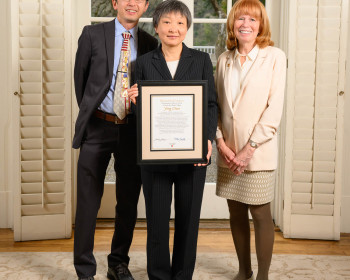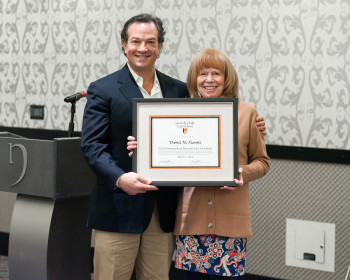GEI Advises OR: How to Reduce Emissions and Help Communities
GEI Staff Attorney Amy Schlusser is one of 34 individuals advising the Oregon Department of Environmental Quality as it develops regulations to cap and reduce greenhouse gas emissions.
Open gallery

Green Energy Institute (GEI) Staff Attorney Amy Schlusser was appointed to the Rulemaking Advisory Committee to advise the Oregon Department of Environmental Quality (DEQ) on the development of the state’s forthcoming Climate Protection Program, which will reduce greenhouse gas emissions from transportation fuels and natural gas used in Oregon. Oregon has committed to a number of climate targets—including an at least 80% reduction below the 1990 level of greenhouse gas emissions by 2050.
DEQ implements Oregon’s environmental laws through its regulations and related programs. In March 2020, Governor Brown issued an Executive Order on Climate Action (EO 20-04) that directed DEQ and the Environmental Quality Commission to adopt regulations to cap and reduce greenhouse gas (GHG) emissions and put Oregon on track to reduce emissions at least 80% below 1990 levels by 2050. DEQ launched the current Climate Protection Program rulemaking to implement the directives established by EO 20-04.
The Oregon Environmental Quality Commission appointed a rulemaking advisory committee to advise DEQ in the development of the Climate Protection Program.
Through her role on the rulemaking advisory committee, Schlusser advocated incorporating environmental justice (EJ) protections into the Climate Protection Program. The proposed “Community Climate Investments” mechanism will allow regulated entities – such as oil companies that sell gas in Oregon – to purchase credits from DEQ-certified nonprofits that invest in projects and programs that reduce emissions and provide other co-benefits in EJ communities.
“The big concern [with requiring emissions to drop by 80% by 2050] was that it would have a negative impact on marginalized communities because if you tell an oil company they need to reduce emissions, there’s a risk that they will increase the price of the product. This would result in disproportionate harm to communities that already devote a large percentage of their income to energy and transportation costs,” Schussler shares.
Schussler hopes that this mechanism of reinvesting funds back into impacted communities will generate revenue that will be used for projects that increase energy efficiency and help electrify buildings and vehicles in communities that risk being left behind by the transition to a decarbonized economy.
“There are plenty of ways we can address climate change, but if we don’t address climate change in an equitable manner, then we won’t benefit society as a whole. Reducing emissions while also providing equity benefits is one of the major objectives of the Climate Protection Program. Actually making investments that benefit EJ communities—instead of just talking about our equity goals without backing them up with meaningful action—is essential. I’m happy that DEQ is moving forward with the Community Climate Investment proposal and think it has the potential to provide real benefits to communities and help mitigate our climate impacts at the same time.”
Law Communications is located in room 304 of Legal Research Center (LRC) on the law Campus.
MSC: 51
email jasbury@lclark.edu
voice 503-768-6605
Cell: 626-676-7923
Assistant Dean,
Communications and External Relations, Law School
Judy Asbury
Law Communications
Lewis & Clark Law School
10101 S. Terwilliger Boulevard MSC 51
Portland OR 97219

